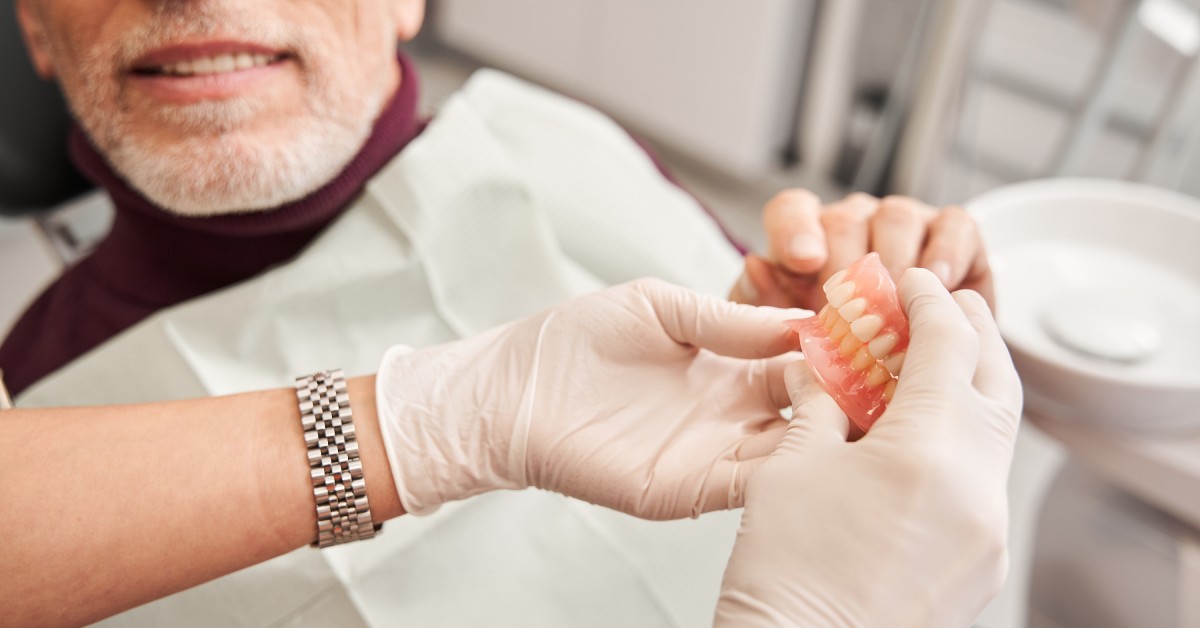
Getting new dentures marks an exciting milestone in your oral health journey, but it also brings questions about daily activities like eating. Many new denture wearers feel uncertain about what foods they can enjoy and how to navigate meals comfortably.
The adjustment period following denture placement requires patience and gradual adaptation. Your mouth needs time to accommodate these new teeth, and your eating habits will naturally evolve during this process. With this complete guide to eating after getting dentures, you can learn to eat confidently while protecting your investment in your oral health.
Understanding Your New Dentures
Dentures function differently from natural teeth, requiring specific techniques for effective chewing and eating. Whether you have removable or permanent dentures, your jaw muscles and tongue need time to develop new movement patterns.
Additionally, dentures have less than 20 percent of the chewing force of regular teeth. This learning and adaptation process typically takes several weeks as your mouth adjusts to the presence and functionality of your new teeth.
The fit of your dentures impacts your eating experience. Well-fitted dentures should feel secure against your gums without causing excessive pressure or discomfort. During the initial weeks of adjustment, some denture looseness is normal as your mouth adapts.
However, persistent problems with denture fit require an appointment with your dental provider. For instance, lower dentures generally will not feel as secure as upper dentures due to tongue movements that tend to push the denture out of place.
Further, if your jaw is too thin, your dentures will also have a more difficult time staying in place. Pinnacle Dental Associates can give you the security of a proper fit and a smooth transition to wearing your new dentures.
Introducing Soft Foods Into Your Diet
Begin this next chapter of your eating journey with soft, easy-to-chew foods that require minimal jaw pressure. Mashed potatoes, yogurt, and well-cooked pasta are excellent starting options. These foods allow your mouth to practice the new chewing motions without overwhelming your healing tissues.
Soups are nutritious and comforting during the initial adjustment period. They provide calories and protein while being gentle on sensitive areas. Adding protein powder to smoothies can help you maintain your nutritional intake when solid foods are difficult to eat. Blending food and using gravies or sauces can be more manageable than whole pieces.
Foods To Avoid Initially
Sticky foods like caramel, taffy, or peanut butter can pull at your dentures and cause displacement. These substances can also be difficult to clean from your prosthetics. Hard foods, including raw carrots, apples, nuts, tough meats, and crusty bread, require greater biting force that may be uncomfortable or cause denture movement.
Modify or avoid corn on the cob, whole apples, and other foods requiring front-tooth biting until you’re fully adjusted. Extremely hot foods and beverages can also be problematic because dentures may mask temperature sensation, increasing burn risks. Allow hot items to cool slightly before consuming. Additionally, carbonated drinks may cause discomfort under your dentures, so limit your consumption.

Chewing Techniques for Denture Success
Learning proper chewing techniques greatly improves your eating experience with dentures. Use both sides of your mouth simultaneously to maintain balance and prevent denture movement. This bilateral chewing approach keeps your prosthetics stable while distributing pressure evenly across your gums.
Cut food into smaller pieces before eating. Smaller portions require less jaw force and reduce the risk of denture displacement. Use your tongue to position food between your back teeth, where chewing power is strongest and most effective.
Gradually Expanding Your Diet
After the initial adjustment period, which is typically two to four weeks, you can begin introducing more challenging foods back into your diet. Start with slightly firmer textures, like tender cooked vegetables, soft fruits, and well-cooked grains. Monitor how your mouth responds to each new food type.
When you feel ready to tackle harder foods, modify your approach. Slice apples thinly, cut corn off the cob, choose softer bread varieties, and steam vegetables until tender. These modifications allow you to enjoy a variety of foods while protecting your dentures.
Professional denture dental services can provide personalized guidance on diet progression based on your specific denture type and healing progress. Regular checkups with your dental provider will keep your dentures fitting properly as you expand your food choices and your eating confidence grows.
Maintaining Proper Nutrition
Prioritizing adequate nutrition during denture adjustment requires thoughtful meal planning. Focus on nutrient-dense foods that are easy to consume with your new teeth. Incorporate plenty of cooked vegetables and soft fruits to maintain vitamin and mineral intake. Consider vitamin supplements if your food variety is temporarily limited during adjustment.
Meal timing can impact your comfort level with dentures. Eating smaller, more frequent meals may be easier than large portions that require extended chewing. This approach can help you maintain steady energy levels while your eating patterns adapt to your new dentures.
Managing Common Eating Challenges
Food particles may occasionally become trapped under your dentures, causing discomfort. Remove your dentures gently, then rinse your mouth and the new teeth with warm water. Carry a small denture brush for cleaning when eating away from home.
Some people experience increased salivation or dry mouth during denture adjustment. Staying well-hydrated helps manage these conditions. Sugar-free gum or lozenges can stimulate saliva production if dryness becomes problematic, but make sure these products won’t stick to your dentures.
Eating in Social Situations
Social dining can feel intimidating with new dentures, but preparation builds confidence. Review restaurant menus in advance when possible to identify suitable food options. Don’t hesitate to ask for modifications, like extra cooking time for vegetables or sauces on the side.
Bring denture adhesive if recommended by your dentist for extra security during important meals, and pack a small cleaning kit for post-meal denture care. Remember that most people won’t notice your dentures, so focus on enjoying the social aspects of shared meals.

Prioritizing Professional Support and Follow-up Care
Regular dental appointments are still necessary after receiving dentures. Your dental team can address fit issues, provide eating technique guidance, and guarantee your dentures continue meeting your needs.
Don’t hesitate to contact your dental provider if eating remains difficult after the initial adjustment period. Persistent pain, frequent denture displacement, or an inability to chew properly may indicate fit problems requiring professional attention. Early intervention prevents more serious complications.
For dentures that will not stay in place, even after adjustments, your dentist may suggest implants for the dentures to snap onto. In fact, implants are now the standard of care for lower dentures because they improve retention and chewing efficiency.
Pinnacle Dental Associates offers comprehensive denture care and support throughout your adjustment process. Their experienced team understands the challenges of adapting to dentures and provides personalized guidance for successful eating and overall denture satisfaction.
Building Long-Term Success
Remember that denture adjustment is a gradual process with individual variations in timeline and experience. Focus on progress rather than perfection, celebrating small victories like successfully eating a previously challenging food. Your persistence and positive attitude contribute to your overall success with dentures.
With proper care, technique, and professional support, dentures can restore your ability to enjoy a varied, nutritious diet. The initial adjustment period gives way to confident eating and renewed enjoyment of meals with family and friends.
Using this complete guide to eating after getting dentures is just the beginning of getting used to your new teeth. Pinnacle Dental Associates will put you on the right path to a happy and healthy smile.
